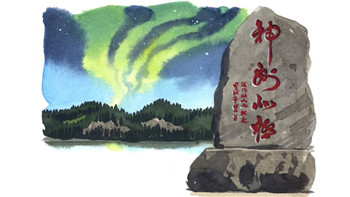漠河,这座位于中国最北端的城市,偏远而又不适宜居住。这里广阔的森林中居住着熊和狼。到了冬天,气温通常会降至零下五十度。但每到夏天,数以千计的游客会跳上SUV和私人包车,朝圣般地前往漠河最北端的定居点,一个名为北极村的村落。
Mohe, the northernmost county in China, is remote and inhospitable, its vast forests home to bears and wolves. In winter, temperatures regularly drop below minus 50C. And yet every summer, thousands of tourists jump in SUVs and private taxis to make a pilgrimage to Mohe’s most northerly settlement, the village of Beijicun.
他们来到这里眺望阿穆尔河(Amur River,中国人将这条河称为黑龙江,其所在的省份也由此得名)对岸的俄罗斯,同时也是为了向人夸耀他们曾经站在中国版图的最顶点,最重要的是,希望能有机会一睹北极光的风采。
They come to peer at Russia across the Amur River (whose Chinese name Heilong Jiang, or Black Dragon River, gives the province its name), as well as to brag that they have stood at the very top of the country, and above all, to try to catch a glimpse of the Aurora Borealis, the Northern Lights.
我自己的漠河之旅是受冰岛一家博物馆的影响,在那里我了解到,在中国境内是有可能看到北极光的,虽然我很快就明白这种情况发生的概率不高。当地人称,就算在漠河待上几十年,看见极光的次数也可能屈指可数。但这种渺茫的概率并没有阻止北极村将今年6月21日的夏至日定为当地的“北极光节”。
My own trip was inspired in an Icelandic museum where I had learned that it was possible to see the lights in China, although it quickly became apparent that the chances of doing so are rare. You could spend several decades in Mohe and only see them a handful of times, according to locals. But the slim odds haven’t prevented the village of Beijicun from declaring June 21, the summer solstice, to be its “Northern Lights festival”.
从漠河市出发,沿公路前往北极村大概需要一个小时;而从黑龙江省会哈尔滨出发前往漠河市,大约需要乘坐20个小时的火车——不过让人高兴的是,近期开始运营的一趟空调列车将上述时间缩短了90分钟。
Reaching Beijicun takes about an hour by road from Mohe City; getting to Mohe City from Harbin, capital of Heilongjiang province, takes about 20 hours by train — though, thankfully, a recently launched air route cuts this to 90 minutes.
我从漠河市出发,踏上了向北行进的道路,一路上森林变得愈加浓密,山岭也陡峭了起来。终于我们来到了一片林间空地,当地一些官员为了“北极光节”的活动也出现在了那里。北极村在一年中的绝大多数时间都只是一个默默无闻的安静小村庄,现在这里建起了一个检票入口,入口设在一座类似阿尔卑斯风格的木屋中,而这座木屋看起来就好像小说人物海蒂可能居住过的地方;邮局门口甚至有了一棵圣诞树。人们似乎没能就哪些特色能够代表中国最北端的这片土地达成共识,村里有好几个地方都吸引着游客留下必不可少的自拍照片。或许阿穆尔河铺满鹅卵石的裸露河岸是这里的最大特色,由于冬季的最后一场降雪已经消弥,河水现在处于低潮期。
As I set out on the road north from Mohe City the forest thickened and the hills steepened until we reached a wooded glade peppered with local Communist party officials there for the occasion. An unremarkable sleepy hamlet for most of the year, Beijicun had set up a ticketed entry point in the sort of Alpine-style cabin Heidi might have lived in; the Post Office even had a Christmas tree. Nobody seemed to quite agree on what constitutes China’s northernmost patch of land, with several spots around the village attracting tourists for the obligatory selfie. Perhaps the Amur’s exposed beaches of shingle lay the best claim, with the river in low ebb now that the last of winter’s snowfall has gone.
对像我这样孑然一身的外国游客来说,北极光节提供了一瞥中国国内快速发展的旅游业的绝佳窗口。“旅行发烧友”人数众多——他们通常极其爱好摄影或者骑行——其中很多人都是从漠河市骑自行车过来的。其他游客则很珍惜沿阿穆尔河徒步行走舒展筋骨的机会,尽情享受中国境内所能找到的最清新的空气——由于中国的主要城市都深受糟糕的空气质量之苦,清新的空气具有实实在在的吸引力。
For the lone foreigner the festival offered a fascinating glimpse into the rapid development of China’s domestic tourist industry. “Hobbyist” travellers — those with a serious interest in photography or cycling — were abundant, with scores biking up from Mohe City. Others were relishing the chance to stretch their legs on hikes alongside the river, enjoying some of the freshest air available anywhere in China — a genuine attraction in a country whose major cities are plagued by terrible air quality.
北极村无疑把希望寄托在了持续不断的游客人流上:花哨的木质旅社在各个地方拔地而起,当地的宾馆里有那种用亮光纸印刷的手册,向想要拥有终极乡居住所的人群推销木质结构房屋。
Beijicun is clearly pinning its hopes on a continued stream of visitors: twee wooden guesthouses are sprouting up everywhere, and glossy brochures in local hotels advertise timber-frame houses for sale for those who want the ultimate rural retreat.
回到漠河市,当地的地方政府也一点都不马虎:大自然也许没有献上自然之光的演出,但当地举行了盛大的焰火燃放活动作为替代——即便这个极北之地的长时间日照减弱了焰火表演的效果。
Back in Mohe City, the authorities were taking no chances: Mother Nature might not have obliged with a natural light show but there was a spectacular fireworks display instead — even if the long hours of sunshine this far north diminish their impact.
当地的宽阔街道是这座城市不够恰当的宏大景观之一,但它们同样暗示着一段悲惨的过往。1987年漠河市被一场大火损毁了大半,整座城市按照宏伟的俄式皇家风格进行了重建。即便这里的机场看起来也像是托尔斯泰(Tolstoy)小说中的建筑,有着圆形屋顶、拱形窗户和金色的嵌字。但环绕这座城市的森林从未被完全限制生长。漠河市周边地区之间的林地被允许作为公园保存下来,使人联想起格林童话中笼罩大地的黑暗森林。
The wide boulevards suggest a misplaced civic grandiosity but they also point to a tragic past. Largely destroyed by fire in 1987, the entire town was rebuilt in a grand imperial Russian style. Even the airport looks like something out of a Tolstoy novel, with cupolas, arched windows and golden lettering. But the surrounding forest is never kept entirely at bay. The woodlands that have been allowed to remain as parks between Mohe City’s neighbourhoods evoke of the enveloping darkness of a Brothers Grimm fairytale.
淘金者的雕塑纪念的是这个地区在19世纪末期的短暂采矿热潮,这一热潮吸引了来自俄罗斯、日本和韩国的投机者。俄罗斯带来的影响如今依然可见:俄罗斯套娃和俄罗斯巧克力被摆放在旅游纪念品商店的醒目位置,和漠河地区特产的皮毛制品以及风干蘑菇摆放在一起。
Statues of goldpanners celebrate the region’s brief mining boom at the close of the 19th century, a rush that attracted speculators from Russia, Japan and Korea. Russia’s influence lingers visibly: matryoshka dolls and Russian chocolate are prominently displayed in tourist stores, alongside furs and dried mushrooms, a speciality of the region.
在返回那座充满魅力的机场准备登上飞往南方的航班时,游客们徘徊在跑道上摆姿势拍照,尽情沐浴在明亮得耀眼的日照中,以纪念他们的中国最北端之旅。
Returning to the attractive airport for the flight south, visitors lingered on the runway to pose for photos, to soak up another stunningly bright day and to celebrate their journey to China’s far north.
本文作者詹妮弗•汤普森(Jennifer Thompson)是英国《金融时报》驻香港记者
Jennifer Thompson is a Hong Kong-based reporter for the FT
旅行细节
Details
中国南方航空公司(China Southern Airlines,网址csair.com)提供从哈尔滨飞往漠河市的航班。詹妮弗•汤普森住宿的酒店是漠河市的金马酒店(Golden Horse Hotel),该店可以通过英文网站hotelsone.com以及chinahotels.net进行预定。
China Southern Airlines (csair.com) flies from Harbin to Mohe City. Jennifer Thompson stayed at the Golden Horse Hotel in Mohe City which can be booked via English-language websites hotelsone.com and chinahotels.net
